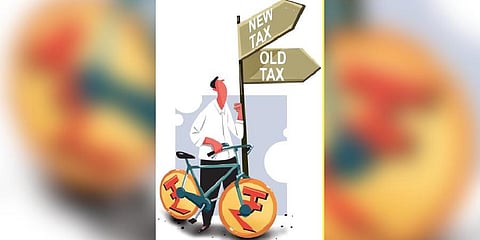

It was a whirlwind week. The Union Budget for the financial 2023-24 ticks most boxes right, and it was supposed to lift the animal spirits of businesses and stock markets. But financial markets went into a tizzy as the drama over the Adani Enterprises follow-on offer for equity shares unfolded.
For the first time, there was a divergence in the performance of the NSE Nifty and the BSE Sensex. While the Nifty has two Adani group stocks as constituents, BSE has none. While one Adani stock shed half of the market value over the past five days, the other lost 25%. There are lessons galore.
Despite a price fall in Adani stocks, Adani Enterprises trades at a price-earnings multiple in the high triple digits. Reliance Industries, the biggest refiner and conglomerate, trades at less than 25 times profits. If the short-seller action has created panic, there could be a further correction in the share price of Adani Enterprises.
An important lesson is about diversification. If you invest through a mutual or index fund, you spread your risk across stocks. The Adani episode highlights the downside of putting your eggs in one basket. There is a lot of interest in listed companies that rally. Momentum is generally with such stocks, and you tend to follow everyone else in the buying frenzy.
However, a price-earnings multiple of over 100 should always concern you. Finding out the data is no big deal. It is readily available if you search the web. There can be no excuse. While the Adani episode created a buzz in local and international media, regulators worldwide have opened investigations based on the Hindenberg report. Amidst all that frenzy, many of you probably missed the good news.
Budget 2023-24 brought some relief to the middle class and the rich simultaneously. You benefit from an effective cut in the income tax. However, you must move to the new tax regime to take advantage of that tax cut. The government wants you to do so and encourages it through tax incentives. The new tax regime means you have to give up the habit of seeking exemptions through savings in insurance, fixed deposits, home loans or tax saving schemes. The effort is to simplify the tax regime, and existing exemptions and deductions make tax management complex.
For you, that is a change in the way you plan your taxes. You need to let go of a few habits. Many of you are found to save, invest or insure for tax benefits. You must shun that habit and inculcate discipline in your monthly savings and investing. Regularly investing every month through a mutual fund or an index fund will help you build wealth steadily. Running from pillar to post towards the end of the financial year to meet tax saving deadlines will soon be a thing of the past.
The rich among you need to change their habits too. The government has plugged two loopholes used by the rich to generate a tax-free return. The first one was in life insurance policies that guaranteed a return to the rich for a very high annual premium.
ALSO READ | Old vs New: Which tax regime to choose from?
The money was tax-free on maturity thus far. The other is about the investment of capital gains from selling the property. There is a limit to how much can be invested to save tax. That should slow down the churn of real estate.
The message from the government is unmistakable. India is a country with credible tax laws. It is not a tax haven. If you need the government to help you with lower taxes, you must pay taxes regularly and file your returns. The tax relief for the salaried is a timely one in the context of the prevailing inflationary trend over the past two years.
ALSO READ | Riding merry-go-round right now, right here
While it may not help you to eliminate your difficulties, it gives you some relief from the pain of the price rise. The important task ahead of you is to save, invest or spend the additional savings. While the government may want you to do all three, you must figure out your priorities and then make an appropriate asset allocation.
Attempt to simplify tax regime
The new tax regime means you have to give up the habit of seeking exemptions through savings in insurance, fixed deposits, home loans or tax saving schemes. The effort is to simplify the tax regime, and existing exemptions and deductions make tax management complex.
Rajas Kelkar
(The author is editor-in-chief at www.moneyminute.in)